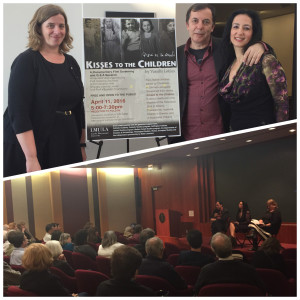By André Enriquez ’17 and Beth McLaughlin ’17
It often takes the mind of a child to open our eyes to the simple, subtle, and yet significant realities of the world. Unfortunately, though, it also often takes that same world to open a child’s too far, blinding them with the harshness of those realities they seem to somehow understand.
On Monday April 11, 2016, classics professor Katerina Zacharia hosted Greek writer and filmmaker Vassilis Loules and screened his documentary film “Kisses to the Children.” Through a series of interviews, photographs, journal entries, and raw family footage, “Kisses to the Children” unveiled the stolen childhoods of five Holocaust survivors in Greece, and documented their then lives living as ghosts in a very real world.
“This is not just another Holocaust film,” Loules said. “It’s a film about the [lost] childhood [of five survivors].”
He connected stories of the Christian families who risked their own safety for that of the children’s, stories that shed light on an environment where everyone was an adult. The film opened the audience to a world confined to windows, where “life” passed by and existed just beyond reach, and where reality was mummed. We were shown a childhood where motorcycles and helmets were the things of nightmares, where you could live in a community of hundreds and have no neighbors, and where mirrors weren’t present because you never needed one to go outside. “It’s as if I were there and not there,” one of the featured children said in the film, “wandering [as a] spirit in this story,” her story. Another survivor described watching a grandmother being loaded onto a train, and seeing her father in tears saying farewell from behind a window to his own mother whom he had to leave behind for his children’s sake, understanding the sacrifice of one generation for another at the tender age of nine.
“Even in the worst conditions, people can show their humanity,” Loules commented after the curtain went down. “There is always a light. That is the message of my film.”

As many as 140 students, faculty and members of the wider Greek-American diaspora in Los Angeles attended the screening. During the question-and-answer session that followed, a number spectators identified themselves as Holocaust survivors. Several were Greek children who had been hidden during the war, like in the film, and they stood up to share their stories. Moderated by Zacharia, a lively discussion ensued with the filmmaker and history professor Elizabeth Drummond about the difficulty of uncovering the narratives of those rescuers who hid the children, since most have already died. At the end of the discussion session, guests attended a reception on the third floor, sharing stories and expressing their appreciation, often in their native Greek.
“The event was very moving,” said Beth McLaughlin ’17. “The testimonies given by the survivors at the end made the experience suddenly very real…While the documentary itself was powerful and deeply moving, it was far more memorable to watch this story of lost childhoods in the presence of those who had lost their own.”
The event was sponsored by the following Loyola Marymount University departments, programs, and institutes: Catholic Studies, the Huffington Ecumenical Institute, Jewish Studies, the Academy for Catholic Thought and Imagination, Modern Greek Studies, Classics & Archaeology, Theological Studies, History, and European Studies, with additional support from the independent sponsor, Holocaust survivor Stella Leontsini.
André Enriquez ’17 is an English major and Classics & Archaeology minor at Loyola Marymount University; Beth McLaughlin ’17 is a Classics and Archaeology major at Loyola Marymount University.



